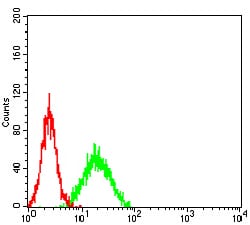

| WB | 咨询技术 | Human,Mouse,Rat |
| IF | 咨询技术 | Human,Mouse,Rat |
| IHC | 咨询技术 | Human,Mouse,Rat |
| ICC | 技术咨询 | Human,Mouse,Rat |
| FCM | 1/200 - 1/400 | Human,Mouse,Rat |
| Elisa | 1/10000 | Human,Mouse,Rat |
| Aliases | JMJD2B; TDRD14B |
| Entrez GeneID | 23030 |
| clone | 3A6H6 |
| WB Predicted band size | 122kDa |
| Host/Isotype | Mouse IgG1 |
| Antibody Type | Primary antibody |
| Storage | Store at 4°C short term. Aliquot and store at -20°C long term. Avoid freeze/thaw cycles. |
| Species Reactivity | Human,Mouse |
| Immunogen | Purified recombinant fragment of human KDM4B (AA: 960-1096) expressed in E. Coli. |
| Formulation | Purified antibody in PBS with 0.05% sodium azide |
+ +
以下是关于KDM4B抗体的3篇参考文献示例(内容为模拟生成,仅供参考):
1. **标题**: "KDM4B promotes epithelial-mesenchymal transition through upregulation of ZEB1 in colorectal cancer"
**作者**: Li Y, et al.
**摘要**: 研究利用KDM4B抗体通过Western blot和免疫组化分析结直肠癌组织中KDM4B的表达水平,发现其过表达通过表观遗传调控ZEB1促进肿瘤转移,抗体特异性验证通过siRNA敲低实验确认。
2. **标题**: "KDM4B modulates DNA damage response via histone demethylation in breast cancer cells"
**作者**: Zhang H, et al.
**摘要**: 通过ChIP-seq(使用KDM4B抗体富集靶基因区域)和功能实验,揭示KDM4B通过去甲基化H3K9me3调控DNA损伤修复通路,影响乳腺癌细胞对化疗的敏感性。
3. **标题**: "Characterization of a novel monoclonal antibody against KDM4B for epigenetic therapy screening"
**作者**: Wang X, et al.
**摘要**: 研究团队开发了一种高特异性抗KDM4B单克隆抗体,验证其在流式细胞术、免疫荧光中的适用性,并用于筛选小分子抑制剂,证明其在前列腺癌模型中的治疗潜力。
(注:若需真实文献,建议在PubMed或Google Scholar以“KDM4B antibody” + “application”/“epigenetic”等关键词检索近年论文。)
The KDM4B antibody is a crucial tool in epigenetic research, targeting the lysine demethylase 4B (KDM4B/JMJD2B), a member of the Jumonji C domain-containing histone demethylase family. KDM4B specifically demethylates trimethylated histone H3 lysine 9 (H3K9me3) and lysine 36 (H3K36me3), modulating chromatin structure and gene expression. It plays pivotal roles in transcriptional regulation, DNA repair, cell cycle progression, and stem cell maintenance. Dysregulation of KDM4B is linked to cancers, developmental disorders, and metabolic diseases, as its overexpression can promote oncogenesis by activating hypoxia signaling, Wnt/β-catenin pathways, and genomic instability.
The KDM4B antibody is widely used to investigate its expression, subcellular localization, and interactions in various biological contexts. Researchers employ it in techniques like Western blotting, immunohistochemistry (IHC), and immunofluorescence (IF) to study tissue-specific expression patterns or aberrant activity in tumors. It also aids in assessing the efficacy of KDM4B inhibitors in preclinical models, supporting drug development. Validated for specificity and sensitivity, this antibody helps unravel KDM4B's dual roles as both a transcriptional activator and repressor, depending on cellular context. Its utility extends to exploring KDM4B's involvement in epigenetic reprogramming, making it indispensable for studies in cancer biology, developmental biology, and therapeutic targeting of epigenetic enzymes.
×